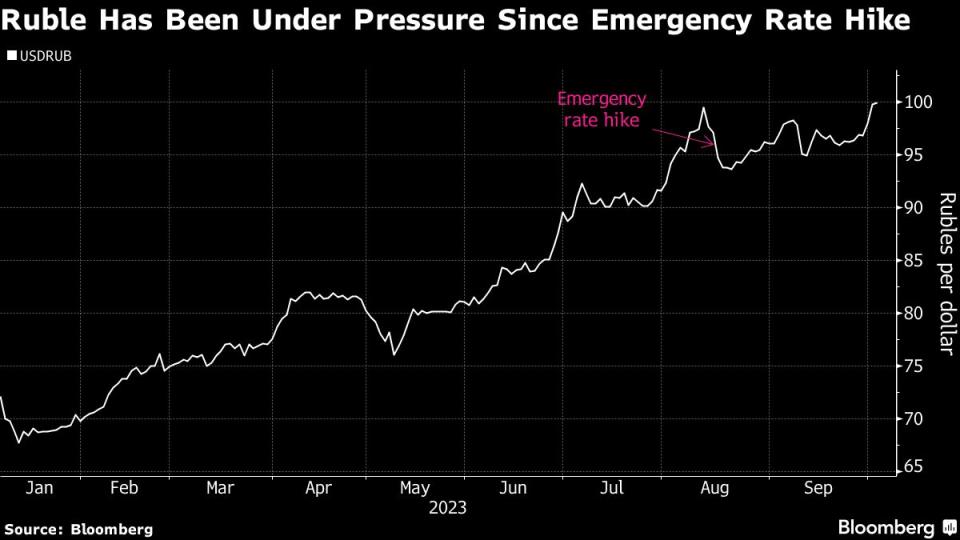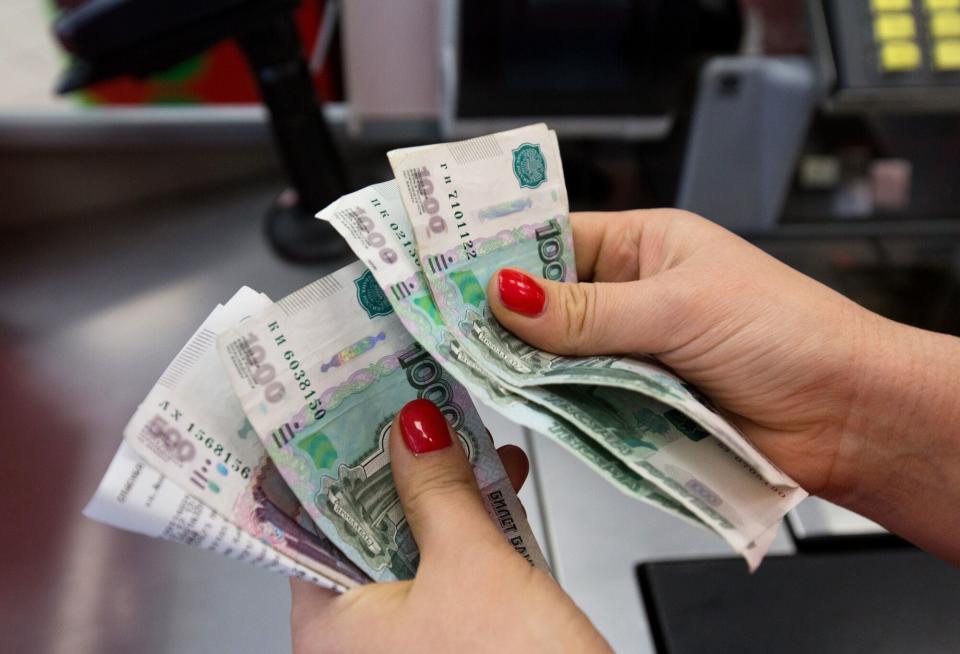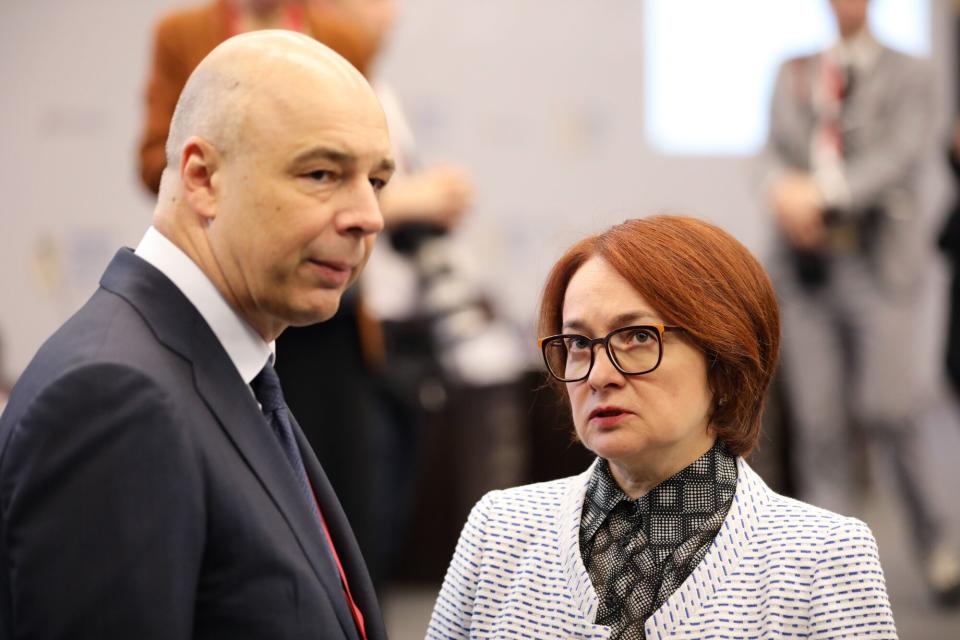Russia Resumes Wartime Capital Controls as Putin Nears Elections
(Bloomberg) -- Russia’s government is reimposing tougher capital controls over the objections of the central bank, according to people familiar with the matter, acting to keep a closer grip on the ruble as Vladimir Putin prepares for presidential elections.
Most Read from Bloomberg
Top House Republican Wants Help From Democrats to Pick a Speaker
Israel Latest: UN Staff Given Evacuation Order for Northern Gaza
Israel Latest: Mideast Rallies Spread As UN Warns Of Gaza Crisis
Video Game Cyberpunk 2077 Uses AI To Replace Deceased Voice Actor
Jeff Bezos Buys His Florida Neighbor’s Mansion for $79 Million
The surprise announcement late on Wednesday imposed measures that will extend over the next six months, a period encompassing Putin’s campaign for a fifth term in elections scheduled for March. They will force 43 groups of exporter companies, including the country’s main oil producers, to sell their earnings from sales abroad on the domestic market for rubles to ensure a supply of foreign exchange.
The impact was immediate, with Russia’s currency heading for its best day this year on Thursday. It was up 3.1% against the dollar as of 2:40 p.m. in Moscow, recouping some losses after suffering the third-biggest depreciation in emerging markets this year.
The decision marks a return to similarly harsh requirements that were introduced soon after the February 2022 invasion of Ukraine when the ruble plunged, and which were only lifted once the currency had recovered. In the last few months, the ruble slumped again to the psychologically important level of 100 per dollar, in part as a result of a deterioration in trade and the ballooning cost of funding the war.
“The main goal of these measures is to create long-term conditions for increasing the transparency and predictability of the foreign exchange market and reduce the possibility of currency speculation,” First Deputy Prime Minister Andrey Belousov said in a statement.
The government forced the issue in the face of the Bank of Russia’s view that capital controls still aren’t necessary, breaking a deadlock among officials over how to stabilize the currency, according to the people with knowledge of the issue, who spoke on condition of anonymity to discuss deliberations that aren’t public. The central bank took part in the latest discussions but wasn’t informed of the decision in advance, they said.
The Kremlin has been preparing for the presidential elections to deliver Putin a decisive victory and demonstrate he retains the full support of Russians almost 18 months into the faltering war in Ukraine. With the ruble losing a quarter of its value against the dollar this year, the currency is increasingly seen as a barometer of the health of the broader economy and a source of pressure on consumer prices.
Putin may announce he’s running for reelection as soon as November, according to Kommersant.
What Bloomberg Economics Says...
“The fact that the government and the Bank of Russia see the need to coordinate hard currency sales and purchases suggest the deterioration of the local FX market - it is now considered too shallow and illiquid to function in an unregulated way. The measures are unlikely to reduce pressure in the long-term, but may increase FX supply in the coming weeks and months”
—Alexander Isakov, Russia economist.
The Russian currency’s plunge past 100 per dollar in August first revived the debate in Moscow about capital controls. At the time, Russia opted for informal measures to ensure enough foreign exchange is available in the domestic market, while the central bank sharply raised interest rates.
Officials have previously acknowledged their differences on the issue, with the Bank of Russia arguing in favor of monetary measures such as rate hikes and announcing it would refrain from foreign-exchange purchases this year to support the ruble. Finance Minister Anton Siluanov, who advocated a tougher approach, pledged last month that “we’ll still find a joint solution.”
In a statement Thursday, the central bank reiterated that its monetary policy and the trade balance are “the key factors for the stability of the foreign exchange market.” The measures announced by the government, which it described as “targeted,” can “improve the liquidity situation and contribute to reducing short-term volatility in the market.”
Under the new rules, the authorities will set volumes and other details of the mandatory-sales mechanism, with some companies required to report on their transactions to authorities. The government statement cited a presidential decree imposing the capital controls, but that document wasn’t published.
The full decree won’t be made public and has been marked “for administrative use” only, according to a person familiar with the matter.
The measures give authorities an unusual degree of oversight. Russia’s Federal Financial Monitoring Service, known as Rosfinmonitoring, and the central bank will be able to view plans by some companies to sell and purchase foreign exchange in the domestic market.
Rosfinmonitoring representatives will also track and ensure the compliance of some companies with the rules of capital controls, according to the statement.
Read More: Why Putin Is Worried About Russia’s Volatile Ruble
In the view of the government, the approaching election left authorities with a political choice to make, the people said, and persistent jitters in the currency market meant tighter restrictions on the movement of capital were warranted.
An emergency rate hike by the central bank in August, followed by another increase last month, failed to stop the currency’s slide, ehich took the ruble back to 100 per dollar last week.
“Rate hikes alone are inefficient as one of the mechanisms through which they usually support local currency — carry trade — has been disabled by sanctions and capital controls,” said Tatiana Orlova of Oxford Economics. “The return of this particular type of capital control should help.”
The ruble has been under pressure as demand for hard currency in Russia increases amid a recovery in imports at a time when the economy is under international sanctions over the war. Russia’s major exporters, the main providers of foreign currency, have experienced significant declines in export revenues.
Publicly, the central bank denies there are tensions with the Kremlin over the capital controls.
“There are no contradictions between my position and the president’s position on this issue,” Bank of Russia Governor Elvira Nabiullina told lawmakers Thursday, the state-run RIA Novosti news service reported. Most companies remain exempt from the restrictions, which are temporary and will be closely monitored for their effectiveness, she said.
“The sentiment in the foreign exchange market is now changing,” said Vasily Karpunin, an analyst at BCS. “Large importers could take a break from purchasing foreign currency, expecting the ruble’s depreciation as a result of the measures that were taken.”
Most Read from Bloomberg Businessweek
The War in Israel Shows How Social Media’s Idealistic Era Has Ended
Business Schools Aim to Build Entrepreneurs With Expanded Programs
Worst US Bond Selloff Since 1787 Marks End of Free-Money Era
©2023 Bloomberg L.P.






